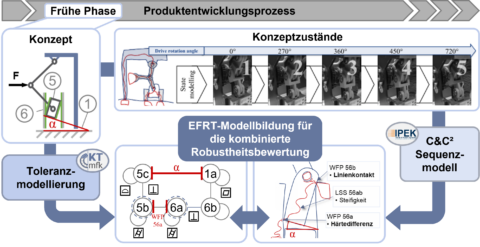Joint DFG project completed by IPEK (KIT) and KTmfk (FAU) on holistic robustness assessment in the early phases of product development.

Efficiency in product development is becoming increasingly important due to growing market requirements. The focus is often on developing products according to the “first-time-right” principle, thus reducing the number of iterations. This results in high costs, especially in late development stages. For example, an iteration is necessary if individual components lead to quality losses due to manufacturing-related deviations. Ideally, however, such variations can be compensated with a concept that is insensitive to these variations. In early development stages, the product and in particular its embodiment is not entirely determined. Therefore, this stage offers a great opportunity for the use of design methods due to the large design margin. The identification of such concepts is the subject of Robust Design, to which the completed project by IPEK at KIT and KTmfk at FAU contributes.
As part of the DFG-funded project “Holistic robustness assessment in the early stages of product development” (467789897), the design and tolerance domains were specifically linked by developing the “Embodiment-Function-Relation and Tolerancing Model” (EFRT-Model). The model addresses the challenges of the early stages, such as the usually limited and qualitative data basis, and offers the possibility of formalizing product concepts using the tolerance graph. The capability to analyze product concepts in different system states allows impacts of variations from different causes (e.g. wear) to be evaluated specifically. In addition to the EFRT-Model, the associated modeling method is a key result of the research project. This specifically addresses the different levels of detail of the data available for new and further development. For example, data from a previous generation must be examined for further development and prepared specifically for the transition to the EFRT-Model. In the case of new development, however, product developers are supported in the development of new concept ideas and the associated EFRT-Models. This modeling method was then evaluated through studies with participants and the applicability of the model and the associated method was confirmed. Essentially, the results provide a new kind of thinking tool that enables early robustness investigations to be utilized as a foundation for decision-making.